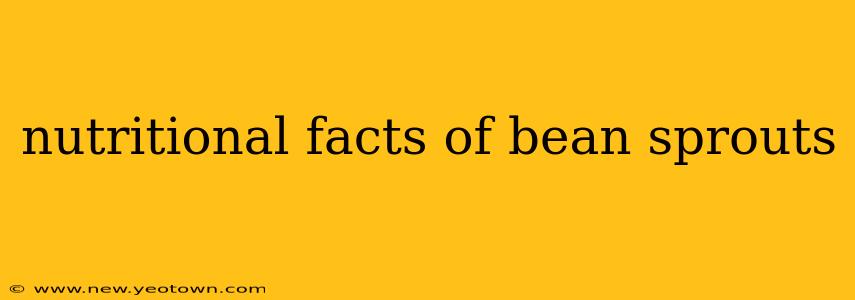Bean sprouts, those delicate, crunchy additions to salads, stir-fries, and sandwiches, are far more than just a textural delight. They're nutritional powerhouses, packed with vitamins, minerals, and antioxidants, all while being remarkably low in calories. Let's delve into the fascinating world of bean sprout nutrition, exploring their benefits and answering some common questions.
My name is Anya Petrova, and I'm a registered dietitian with over 10 years of experience helping people understand and utilize the power of nutrition. I've spent years researching the nutritional benefits of various foods, and bean sprouts consistently impress me with their versatility and nutritional density.
What are the Nutritional Benefits of Bean Sprouts?
Bean sprouts, regardless of the bean they originate from (mung bean, soybean, alfalfa, etc.), boast a surprisingly rich nutritional profile. They're excellent sources of:
-
Vitamins: Bean sprouts are particularly rich in vitamin C, crucial for immune function and collagen production. They also contain folate (vitamin B9), essential for cell growth and development, and vitamin K, important for blood clotting and bone health. Depending on the type of bean, you'll also find varying amounts of other B vitamins.
-
Minerals: These tiny sprouts are packed with minerals like iron, manganese, and magnesium. Iron is vital for oxygen transport in the blood, manganese contributes to bone health and metabolism, and magnesium plays a crucial role in numerous bodily functions.
-
Fiber: Bean sprouts are a good source of dietary fiber, promoting healthy digestion and preventing constipation. This fiber also helps regulate blood sugar levels and can contribute to feelings of fullness, aiding in weight management.
-
Antioxidants: Bean sprouts contain various antioxidants, which protect your cells from damage caused by free radicals. These antioxidants contribute to overall health and may help reduce the risk of chronic diseases.
-
Low in Calories: Bean sprouts are exceptionally low in calories, making them a perfect addition to weight-conscious diets. They offer substantial nutrition without significantly impacting your calorie intake.
What are the Different Types of Bean Sprouts and Their Nutritional Differences?
The nutritional content of bean sprouts can vary slightly depending on the type of bean used to grow them. While the general profile remains consistent across types, some differences exist:
-
Mung Bean Sprouts: These are the most commonly available and are known for their mild flavor and high vitamin C content.
-
Soybean Sprouts: Slightly more assertive in flavor, soybean sprouts are richer in protein compared to mung bean sprouts.
-
Alfalfa Sprouts: These sprouts are recognized for their slightly bitter taste and high vitamin K content.
While the specific nutrient levels might differ slightly, all bean sprout varieties offer substantial nutritional benefits.
How Many Calories are in Bean Sprouts?
A typical serving (approximately 1 cup) of bean sprouts contains roughly 30 calories. This makes them an incredibly low-calorie food option, perfect for those watching their weight or aiming for a calorie-controlled diet.
Are Bean Sprouts Good for Weight Loss?
Yes, their low calorie count, high fiber content, and significant nutrient density make bean sprouts a great addition to a weight-loss diet. The fiber helps you feel full and satisfied, reducing the likelihood of overeating.
Are Bean Sprouts Good for You?
Absolutely! Bean sprouts are a nutrient-dense food offering numerous health benefits. Their vitamins, minerals, antioxidants, and fiber contribute to overall health and well-being. They are an easy and versatile way to boost the nutritional value of many dishes.
Conclusion: Embrace the Sprout Power!
Incorporating bean sprouts into your diet is a simple yet effective way to enhance your nutritional intake. Their versatility, low-calorie count, and impressive nutrient profile make them a valuable asset for health-conscious individuals of all ages. Experiment with them in salads, stir-fries, soups, or as a crunchy topping for your favorite dishes – your taste buds and your body will thank you!

